商务英语谈判 chapter three
- 格式:ppt
- 大小:851.00 KB
- 文档页数:82


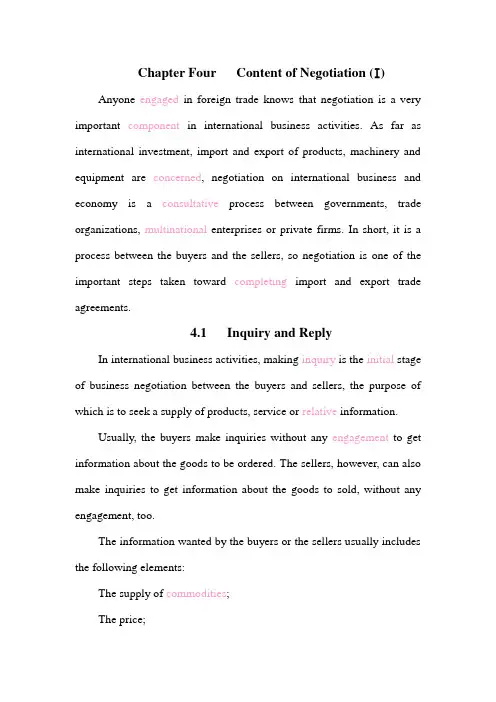
Chapter Four Content of Negotiation (I) Anyone engaged in foreign trade knows that negotiation is a very important component in international business activities. As far as international investment, import and export of products, machinery and equipment are concerned, negotiation on international business and economy is a consultative process between governments, trade organizations, multinational enterprises or private firms. In short, it is a process between the buyers and the sellers, so negotiation is one of the important steps taken toward completing import and export trade agreements.4.1 Inquiry and ReplyIn international business activities, making inquiry is the initial stage of business negotiation between the buyers and sellers, the purpose of which is to seek a supply of products, service or relative information.Usually, the buyers make inquiries without any engagement to get information about the goods to be ordered. The sellers, however, can also make inquiries to get information about the goods to sold, without any engagement, too.The information wanted by the buyers or the sellers usually includes the following elements:The supply of commodities;The price;The catalogue;The packaging;The delivery date;Terms of payment and other terms concerned.Inquiry can be made orally or in written form.If the written form is adopted, the person who makes inquiries should remember to consider carefully to which the inquiries are to be sent and how many supplies or purchases are to be approached in one and the same region. Failure to take into consideration the relevant situation would lead to adverse effect on future transactions.When writing enquiry letters to your counterpart, there is on need to choose words and phrases carefully to draw th e readers’attention. A request for a price list or catalogue can be made in a single sentence. A request for a quotation of price and other trade terms may need a little longer description, which should be clear and exact. But remember there is no need for long, over-polite phrases and still less humbleness.If it is the first transaction between the parties concerned, the first enquiry letter should begin by telling the receiver how his name and address is known. Then, some generally information about your own business, such as the kind of goods handled, quantities needed or to be sold, usual terms of trade and any information likely to enable the suppliers or the buyers to decide what they can do for you, should begiven.Having received the enquiry letter, the receiver should study it with caution and reply the enquiry letter as soon as possible, telling them whether you could sell or buy.If in oral form, especially when the business relations have been established between the buyers and sellers, the inquiries and replies will be very easy and simple. What should be paid attention to is that both of them may have a friendly and cordial discussion according to what has been mentioned.4.2 Offer and Counter-offerIn many types of business, it has always been the practice for the supplier to make an offer directly to his regular customers and to others who may be interested in his goods, without waiting for an enquiry. But when the supplier has received an enquiry from the buyer and decide to sell the goods, he should make an offer to him.It should be pointed out that offer is different from quotation. Quotation is just an indication of price without contractual obligation, and it is subject to change without previous notice. We have learned that a proposal for concluding a contract addressed to one or more specific persons constitutes an offer if it is sufficiently definite and indicates the intention of the offerer to be bound in case of acceptance. So offer is a definite commitment on the part of the supplier.In business activities, when making an offer, orally or in written form, the following elements are usually included:The name, price, quality and quantity of the goods;The date of delivery and/or time of shipment;The terms of payment;The validity of the offer;Other terms concerned, such as packing, discount, insurance, etc.When a supplier promises to sell the goods at a stated price within a stated period of time, the offer made by him is called a firm offer. In making a firm offer, mention should be made of the time of shipment and the date of delivery, the mode of payment desired and the period for which the offer is valid. In addition, an exact description of the goods should be given. If possible, pattern or sample should be shown or sent.It should be noted that a firm offer, although not legally binding, is capable of acceptance, and once it has been acceptable it cannot be withdrawn and the offerer should perform the obligations stipulated in it.It is known that a reply to an offer which purports to be an acceptance but contains additions, limitations or other modifications is a rejection of the offer and constitutes a counter-offer. So, a counter-offer means a partial rejection of the original offer, and it also means a counter proposal put forward by the buyers or the offeree.In practical business negotiations, the buyers may not agree on theprice, packing, shipment or payment, etc. He may state his own terms instead. Such alterations indicate that business has to be negotiated on a renewed basis. Such being the case, the original offerer or the seller now becomes the offeree and is entitled to accept of refuse. In the latter case, he may make another counter-offer of his own. This process can go on for many a round until the transaction is concluded or called off.Sometimes, the sentence “Accept your offer subject to the following alterations……” may be used in answering an offer. Although the word “accept”is used, in fact, the offer is still rejected, because the offeree does not agree to the whole offer.In making a counter-offer, the party concerned should express regret at inability to accept, explain reasons for non-acceptance and suggest that there may be other opportunities to do business together in the future.4.3 Price and Placing ordersIt is known to all of us that price, which should be carefully considered, is one of the most important factors in the international business activities.Price is the money of other considerations exchanged for the ownership or use of a product or service. The products’price includes fixed cost, variable cost and expected profit. The fixed cost and variable cost of export products, however, means the total figure of production cost, selling cost, delivery cost, taxes and tariffs and some other unknowncosts.In any transactions, the buyer wants to buy cheap and the seller wants to sell dear. In order to get the expected target, the buyer or the seller should know the pricing strategies and other factors which can influence the price.As to the pricing strategies, there are three basic techniques of pricing export products, which can be indicated as follows:Cost-plus pricing;Marginal cost pricing;Break even pricing;Besides what have been mentioned above, the international and external factors which can affect pricing should be noted.International factors include:Marketing objectives;Marketing mix strategies;Costs;External factors include:The market and demand;Competitors’ prices and offers;In international business negotiation, because haggling is a common occurrence, the buyer or the seller should not ignore the following items, which can also affect pricing:Fluctuations of the currency used in the transaction;Terms of payment;Date of delivery;Packaging, etc;Everyone knows that negotiating price is a skill needing nerves of calm.Once given the factors affecting prices, the buyer or the seller is now ready to select a workable price. In any case, the price will have to be somewhere between one that is too low to produce a profit and one that is too high to result in any demand.In business discussion, even when the buyer has an advantage over the seller, because of overproduction, etc., and is accordingly able to dictate terms, such as lowering the price, quickening delivery date and so on, he should consider everything on the “you”attitude and give the reasonable price. Of course, when the seller has an advantage over the buyer, the same attitude should be adopted.Having finished negotiation price between the buyer and the seller, the former may place an order to the latter for goods needed on the price agreed upon between them. Once the order has been accepted by the seller, a purchase contract should be singed. After that, both parties are legally bound to carry out their agreement.When the binding agreement comes into force, the buyer’s obligations are:to accept the goods supplied, provided that they comply with the terms of order;to pay for them according to the terms agreed upon;to check the goods as soon as possible (failure to give prompt notice of faults to the seller will be taken as acceptance of the goods);When the binding agreement comes into force, the seller’s obligations are:to deliver the goods exactly of the kind ordered, and at the agreed time;to guarantee that the goods to be supplied are free from faults, of which the buyer could not be aware at the time of purchase.According to commercial law, if faulty goods are delivered, the buyer can demand either a reduction in price, or replacement of the goods, or cancellation of the order. He may also be able to claim damages.Chapter Five Content of Negotiation (Ⅱ)5.1 Packaging 包装It is known that packing is another important element which should be pay attention to by the buyers and the seller when negotiating any transactions, because neither of them like to have the goods shipped or received in a damaged condition. It is appropriate packing that could prevent or minimize the damage of the goods and could promote the sales. Therefore, in modern days, more and more people have come to realize the importance of packing.When discussing packing, the seller should keep the following in mind: ﹙1﹚T he buyers are under certain conditions entitled to reject the goods if they are not packed in accordance with his instruction or with the provisions agreed upon.﹙2﹚P acking should be designed to suit shipment requirements. In case of anomalies in packing, the master of the ship has authority to refuse to sign a clean B/L.Likewise, the buyer is empowered to refuse the acceptance of a B/L which refers to goods marked and branded not in strict conformity with the contract.﹙3﹚P acking should tally with the regulations in the country of destination, because some countries levy very heavy import duties on particular kinds of packing material.Besides what have been mentioned above, the seller should showsolicitude for the appearance and packaging of packing.The features of the packing should be:●Beautiful and durable;●Easy to handle;●Well suited for long distance shipment;●Proof against damage;●Waterproof /shake-proof;●Standardized.The appearance and packaging of packing should be:●Modern and attractive;●Small and exquisite;●Suitable for window display;●Facilitate marketing;In practical business activities, as far as the benefit of the buyer and the seller concerned, both of them should be familiar with the following items.⒈Packing ParametersThe main parameters that affect packing include the following:1)Value of the GoodsPacking depends on the value of the goods, that is, high value consignment usually needs more expensive than low value merchandise. Therefore, packing for valuable goods must be done professional to avoidany damage caused by transactions.2)Nature of the GoodsGenerally speaking, packing depends upon the nature of a products as well as the mode of transportation. For instance, cargo shipped in bulk requires little or no packing at all; small products are usually packed in standard-sized wooden or cardboard boxes; machinery or some heavy goods may need to be shipped in crates; commodities like sugar and coffee are usually packed in bags; and fragile goods should be done professionally.3) Rulers and RegulationsThis has particular relevance to dangerous cargo whose very nature calls for adequate and safe packing in line with strict regulations applicable both to sea and air transportation. Besides, in some countries, straw, wood and some other material are unacceptable forms of packing owing to the risk of insects being imported.4) Temperature VariationTemperature variation is another important factor which should be considered when packing, because some kinds of cargo that will have to undergo the temperature variation will face the danger of deterioration. 5)Cost of packagingWith the overseas markets becoming ever more competitive, the exporter is compelled to explore new methods of packing. The basic principle ofpackaging is to make packaging as light and compact as possible so as to keep freight cost down.⒉Marking of GoodsWhen packing is finished according to the packing instructions from the buyers, marking should be done on the export packages, which mainly include:●The consignees’own distinctive marks, which should include the name of the port of destination;●Any official marks required by authorities concerned, because some countries require the name of the country, there the goods are produced, the weight and dimensions, to be marked on every package.●Special directions or warning which should be stenciled on the package foe the benefit of the owner and the carrier.5.2 Delivery of GoodsWhen discussion the delivery of the goods, the negotiator should be familiar with the following contents:●Modes of the transportation;●Time of shipment;●Place of shipment and place of destination;●Partial shipment and transference;●Shipping advice;●Shipping documents.1.Modes of TransportationAlthough there are many modes of transportation in international trade, ocean transportation is still the most important mode at present.When the buyer and the seller negotiate the ocean transportation, the following items should be paid attention to: regular shipping liner transportation and charter transportation.(1)Regular shipping transportation: it involves the standard forcalculating premium, the liner’s freight tariff, the basic rate, the surcharge, the time of premium payment and the special discount for freight.(2)Charter transportation: it can be divided into voyage charter, timecharter and empty ship charter. Charter transportation cover charter party, rent or freight and the good shipped.2.Time of ShipmentWhen talking about the time of shipment, we should distinguish “shipment” from “delivery”. Under FOB, CFR, CPT and CIP, the time of shipment corresponds to the time of delivery, bur under DES, DEQ, DDU and DDP, the two are quite different, because FOB, CFR, CIF and so on belong to the constructive delivery, and DES, DEQ and so on belong to the actual delivery.When negotiating the time of shipment, the party concerned should know something about the stipulations of shipment time.(1)“Time shipment”means that an actual time of shipment should begiven, such as “Shipment during April and May”(2)“Shipment in the near future”refers to “prompt shipment”,“immediate shipment”, and “shipment as soon as possible”. Because these terms have different explanations in different countries and lines, the negotiators should refrain from using them so as to avoid misunderstanding.(3)“shipment without fixed time”means that the seller will ship thegoods with a certain time only after the payment of the L/C. under this stipulation, the following phrases are usually used:●Shipment within 30 days after receipt of L/C;●Shipment within 15days after receipt of remittance;●Shipment by first available vessel;●Shipment within 20 days after receipt of L/C, which must reachthe seller not later than 30th April.Besides what have been mentioned above, the parties concerned should pay much attention to the canceling date, the demurrage and the dispatch rate, which are also very important in negotiating shipping contract.3.Place of Shipment and Place of DestinationUnder CIF and CFR terms, the port of shipment and the port of destination should be stipulated in the contract. Under CPT and CIP terms, however, the place of destination and the place of the departure should be stipulated in the contract.But under FAS and FOB terms, the port of shipment should be stipulated in the contract, and FCA term, the place of departure should be stipulated in the contract. Although the terms mentioned above only refer to the port of shipment and the place of the departure, it is better to stipulate the port of destination or the place of destination in the contract respectively.4.Partial Shipment and TransportationBesides the time of shipment, the place of shipment, the place of destination, and the mode of transportation in the delivery clause of the contract, there are partial shipment and transshipment in it.(1)Partial shipment usually has the following three forms:●Not specify lots and quantity---the phrase “partial shipments to beallowed” can be used;●Specify lots but not specify quantity---the phrase “shipmentduring May, Jun and July in three installments” can be used;●Specify lots and quantity---the phrase “shipment during May andJune in two equal lots” can be used.(2)Transshipment should be clearly specified in the contract if it isnecessary, such as “transshipment to be allowed”, “transshipment atHong Kong to be allowed”, etc.(3)When partial shipment and transshipment are needed, they should bewritten down in the contract, such as “shipment on of before May 31st from Shanghai to Wellington, allowing partial shipment and transshipment”5.Shipping AdviceAfter making shipment, the seller is required to advise the buyer its effectuation(usually within 24 hours) no matter the transportation is concluded on FOB, CFR or CIF basis, so that the buyer can take necessary measures to take the goods and take out insurance. The required shipping advice usually includes:(1)the contract number and the L/C number;(2)the name of the commodity;(3)the quantity loaded;(4)the invoice value;(5)the name of the vessel;(6)the port of loading and the port of destination;(7)the date of B/L;(8)the date of departure;(9)The expected time of arrival at the port of destination.6.Shipping DocumentShipping document is a kind of main certificate, by which the sellerproves that he has completed his obligation of delivering goods, and on the other hand, the buyer pays for the shipment. If the shipping documents do not strictly conform with the terms of the L/C, the bank will reject them and refuse to pay, so great care is required on the part of export in preparing the shipping documents.The shipment documents required in shipment usually include:(1)bill of landing (B/L);(2)commercial invoice;(3)insurance policy or insurance certificate;(4)inspection certificate or survey report;(5)weight memo (note) and packing list;When discussing shipping documents, the person concerned should know something about the B/L, especially the Ocean B/L.The bill of landing is a document given by a shipping company, representing both a receipt for the goods shipped and a contract for shipment between the shipping company and the shipper. It is also a document of entitlement to the goods, giving the holder or the assignee the right to possess the goods.The ocean B/L usually includes:●shipped B/L or on board B/L;●clean B/L, unclean B/L;●straight B/L;●order B/L;●direct B/L;●transshipment B/L;●through B/L;●Freight prepaid B/L, etc.In a word, when shipping goods by ocean freight, the negotiators must take into account the following:(1) Arranging the port of shipment and the port of destination. Commonly, the seller chooses the port of shipment whereas the buyer decides the port of destination on the basis of mutual agreement.(2) Settling the time of shipment. To avoid future disputes in international trade, the time of shipment must be settled clearly between the buyer and the seller. When settling the time of shipment, the exporters should take every possibility into consideration, such as the supply of goods, international transportation, and external market quotations. The time of shipment should be made suitable to both the seller and the buyer.5.3 InsuranceWhen negotiation the marine cargo insurance, the parties concerned should be first familiar with the following content:●Perils Insured Against;●Marine Transportation Loss;●Types of Insurance.1. Perils Insured AgainstEach shipment in transit may run into various types of dangers. Generally speaking, the risks covered by insurance can be basically divided into two types---“perils of the sea” and “extraneous risks”.The perils of the sea include not only natural calamities such as storms, floods, earthquakes, lighting, etc. but also fortuitous accidents like fire, collision, explosion, stranding and sinking of the carrying vessels, and so on.The extraneous perils are usually caused by external factors, which can be divided into two---the ordinary and the special. The ordinary perils include the theft,pillage,leakage,shortage, rusting, contamination,and so on. But the special perils refer to war, strikes, import duty, rejection and failure to deliver, and so on.2. Marine Transportation LossGenerally speaking, losses on the high seas fall into two categories: total loss and partial loss.⑴Total losses: Actual total loss & constructive total loss;⑵Partial losses: Generally average & particular average;3. Types of InsuranceThe principle perils which the basic marine policy of the PICC insurance against under its Ocean Marine Cargo Clause are:⑴free from particular average (F.P.A.);⑵with particular average (W.P.A.);⑶all risks.These three perils are usually called “basic risks”, which are granted according to institute cargo clauses.Besides the “basic risks”mentioned above, there is another type of risk---additional risk, which can be divided into two---general risks and special additional risks.Generally speaking, general additional risks include:theft, pillage and non-delivery( T.P.N.D.);Fresh water and/or rain damage;Shortage;Intermixture and contamination;Leakage;Clash and breakage;Taint of odor;Sweat and heating;Hook damage;Breakage of packing;Special additional risks, however, include:war risk;Strikes;On deck;Import duty; Rejection;Failure to deliver; Survey at jetty risk;Fire risk extension clause.。
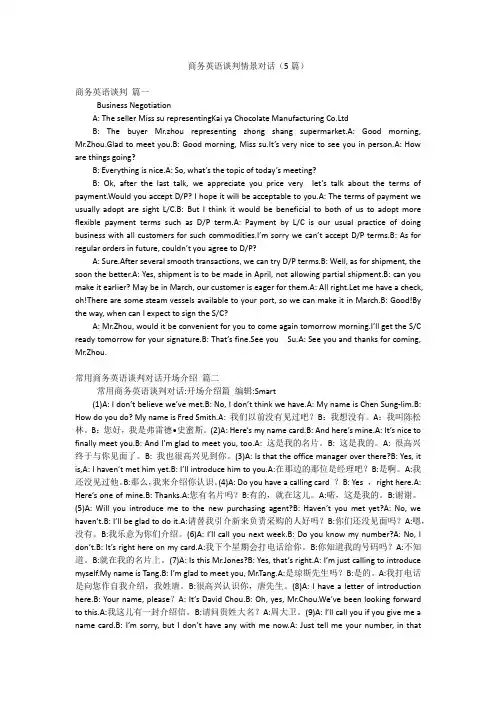
商务英语谈判情景对话(5篇)商务英语谈判篇一Business NegotiationA: The seller Miss su representingKai ya Chocolate Manufacturing Co.LtdB: The buyer Mr.zhou representing zhong shang supermarket.A: Good morning, Mr.Zhou.Glad to meet you.B: Good morning, Miss su.It’s very nice to see you in person.A: How are things going?B: Everything is nice.A: So, what’s the topic of today’s meeting?B: Ok, after the last talk, we appreciate you price very let’s talk about the terms of payment.Would you accept D/P? I hope it will be acceptable to you.A: The terms of payment we usually adopt are sight L/C.B: But I think it would be beneficial to both of us to adopt more flexible payment terms such as D/P term.A: Payment by L/C is our usual practice of doing business with all customers for such commodities.I’m sorry we can’t accept D/P terms.B: As for regular orders in future, couldn’t you agree to D/P?A: Sure.After several smooth transactions, we can try D/P terms.B: Well, as for shipment, the soon the better.A: Yes, shipment is to be made in April, not allowing partial shipment.B: can you make it earlier? May be in March, our customer is eager for them.A: All right.Let me have a check, oh!There are some steam vessels available to your port, so we can make it in March.B: Good!By the way, when can I expect to sign the S/C?A: Mr.Zhou, would it be convenient for you to come again tomorrow morning.I’ll get the S/C ready tomorrow for your signature.B: That’s fine.See you Su.A: See you and thanks for coming, Mr.Zhou.常用商务英语谈判对话开场介绍篇二常用商务英语谈判对话:开场介绍篇编辑:Smart(1)A: I don’t believe we’ve met.B: No, I don’t think we have.A: My name is Chen Sung-lim.B: How do you do? My name is Fred Smith.A: 我们以前没有见过吧?B:我想没有。
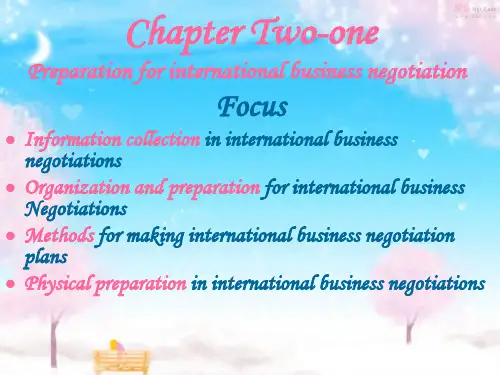

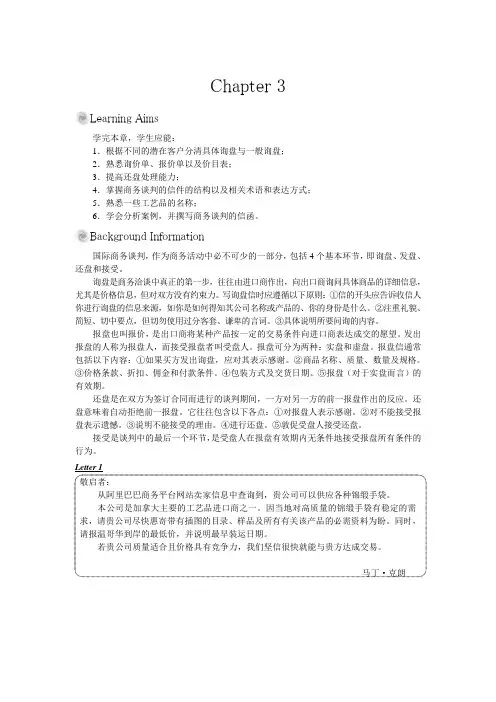
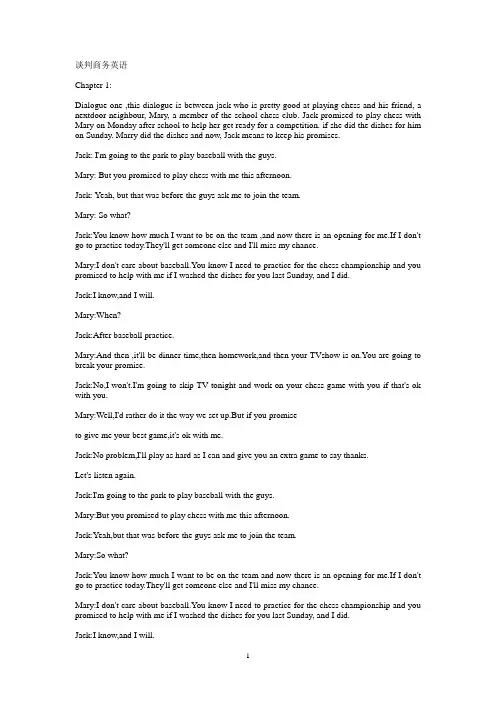
谈判商务英语Chapter 1:Dialogue one ,this dialogue is between jack who is pretty good at playing chess and his friend, a nextdoor neighbour, Mary, a member of the school chess club. Jack promised to play chess with Mary on Monday after school to help her get ready for a competition. if she did the dishes for him on Sunday. Marry did the dishes and now, Jack means to keep his promises.Jack: I'm going to the park to play baseball with the guys.Mary: But you promised to play chess with me this afternoon.Jack: Yeah, but that was before the guys ask me to join the team.Mary: So what?Jack:You know how much I want to be on the team ,and now there is an opening for me.If I don't go to practise today.They'll get someone else and I'll miss my chance.Mary:I don't care about baseball.You know I need to practice for the chess championship and you promised to help with me if I washed the dishes for you last Sunday, and I did.Jack:I know,and I will.Mary:When?Jack:After baseball practice.Mary:And then ,it'll be dinner time,then homework,and then your TVshow is on.You are going to break your promise.Jack:No,I won't.I'm going to skip TV tonight and work on your chess game with you if that's ok with you.Mary:Well,I'd rather do it the way we set up.But if you promiseto give me your best game,it's ok with me.Jack:No problem,I'll play as hard as I can and give you an extra game to say thanks.Let's listen again.Jack:I'm going to the park to play baseball with the guys.Mary:But you promised to play chess with me this afternoon.Jack:Yeah,but that was before the guys ask me to join the team.Mary:So what?Jack:You know how much I want to be on the team and now there is an opening for me.If I don't go to practice today.They'll get someone else and I'll miss my chance.Mary:I don't care about baseball.You know I need to practice for the chess championship and you promised to help with me if I washed the dishes for you last Sunday, and I did.Jack:I know,and I will.Mary:When?Jack:After baseball practice.Mary:And then ,it'll be dinner time,then homework,and then your TVshow is on.You are going to break your promise.Jack:No,I won't.I'm going to skip TV tonight and work on your chess game with you if that's ok with you.Mary:Well,I'd rather do it the way we set up.But if you promiseto give me your best game,it's ok with me.Jack:No problem,I'll play as hard as I can nad give you an extra game to say thanksDialog 2Jack and Mary are now grown up and dating.Their friendship is as strong as ever there's strong bond between them,so their dialog is relaxed and flows pretty freely.It's more like a married coupls than young dating to get to know each other.Mary:Let's have seafood tonight and then go see the new movie at Mall Cinema.Betsy told me it's a beautiful love story and I shouldn't miss it.Jack:Oh,Goodness, please not again.That's what we did last week.Mary:No,we didn'st week we went to see that movie about a man's struggle against mental illness.Jack:Right,it was a chick flick,just like this one,so what's the difference?没错,那是你们女生看的电影,这部也一样.哪里不同?Besides,this is the last week for the third movie in Destroyer series and I want to see that on a big screen.再说,《毁灭者》第三集这礼拜就要下档了,我希望能在大银幕上看这部电影。


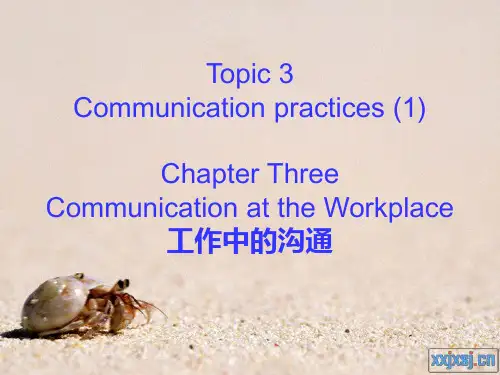
Chapter 1 Principles of Business Negotiation商务谈判的原则何谓商务谈判?谈判是人们为了协调彼此之间的关系,满足各自的需要,通过协商争取达到意见一致的行为和过程。
Negotiation takes place between human beings. It is the most common form of social interaction. Almost everybody inthe world is involved in negotiations in one way or another for a good part of any given day. People negotiate over where to gofor dinner, which movie to watch or how to split household chores.Negotiation, in its modern sense, is defined in The Roots of Sound Rational Thinking as follows: the ability to deal with business affairs, to arrange by discussion the settlement of terms, to reach agreements through treaties and compromise, andto travel through challenging territory. All of these suggest a purposeful effort to resolve problems through talking andintellectual maneuvering. Negotiation includes consultation, bargaining, mediation, arbitration, and sometimes, even litigation.Competitive style To try to gain all there is to gain(竞争式谈判)Accommodative style To be willing to yield all there is to yield(通融式谈判)Avoidance style To try to stay out of negotiation(回避式谈判)Compromising style To try to split the difference or find (妥协式谈判) an intermediate point according tosome principleCollaborative style To try to find the maximum possible (合作式谈判) gain forboth parties----by carefulexploration of the interests of allparties----and often by enlarging the pieVengeful style To try to harm the other(报复式谈判)Self-inflicting style To act so as to harm oneself(自损式谈判)Vengeful and self-inflicting style To try to harm the other andalso(报复和自损式谈判) oneselfPeople who go for the competitive style are known as hard-bargaining negotiators. They start off with outrageous demands, using threats and other tactics to get what they want. One side typically starts out high and the other low. Afterseveral rounds of offer and counter-offer, the negotiators end up “spl itting the difference”. In this form, negotiation is viewed asa game where each side tries to get the best deal for themselves. Neither side exhibits concern for the other side.1.1Principle of Collaborative Negotiation合作式谈判的原则Ⅰ. Collaborative NegotiationNegotiation can also assume the form of collaborative style. It involves people with diverse interests working togetherto achieve mutually satisfying outcomes. Collaborative negotiation is known by many names. Some popular names include “problem-solving negotiation”, “consensus-building negotiation”, “interest-based negotiatio n”, “win-win negotiation”, “mutualgains negotiation”, and so on.The goal of collaborative negotiation is to manage the dispute so that the outcome is more constructive than destructive. A destructive outcome results in damages and involves exploitation and coercion. Aconstructive outcome fosters communication, problem-solving, andimproved relationships.● The negotiation parties have both diverse and common interests.● The common interests are valued and sought.● The negotiation process can result in both parties gaining something.● The negotiating arena is controlled by enlightened self-interest.● Interdependence is recognized and enhanced.● Limited resources do exist, but they can usually be expanded through cooperation and creativity.● The goal is a mutually agreeable solution that is fair to all parties and effective for the community/group.The collaborative negotiation focuses on interests rather positions. Integrative solutions are obtained by understandingother’s self-interests, not by jostling for positions.The collaborative negotiation places value on relationship. It requires trust and relies on full disclosure of relevant information.The disadvantages of this approach are:●It may pressure an individual to c ompromise and accommodate inways not in his best interest.●It avoids confrontational strategies, which can be helpful at times.●It increases vulnerability to deception and manipulation by a competitive opponent.●It makes it hard to establish defi nite aspiration levels and bottom lines.●It requires substantial skill and knowledge of the process.●It requires strong confidence in one’s perceptions regarding the interests and needs of the other side.Ⅱ. Principled NegotiationIn this form, each side of the negotiating parties attempt to meet the other side’s interest as well as their own. By thoroughly understanding their own interest as well as the other’s, both sides are often able to arrive at solutions neither alone could have envisioned or made possible. In this type of negotiation, each side recognizes and accepts the legitimate interests of the other side and they are committed to dealing with differences constructively in order to advance their own self-interests. This has been called “collaborativeprincipled negotiation”, a concept set forth by Roger Fisher and William Ury in their book Getting to Yes: Negotiating Agreement Without Giving In.Principled negotiation is particularly oriented to collaborative negotiations. However, it can be used in competitive negotiations and inother aspects of conflict management. It is a method that is centered around four considerations (PIOC):● People: Separate the people from the problem.● Interests: Focus on interests, not positions (inte rests always underlie positions).● Options: Invent options for mutual gains.● Insist on using objective criteria.1.Separate the people from the problemFisher and Ury pointed out that “negotiators are people first”. There are always relational and substantive issues in negotiation. The relational issue tends to become entangled with the problem and the positional bargaining puts relational and substantive issues in conflict with each other. Fisher and Ury suggested that the negotiators separate the relationship from the substance and deal directly with the people problem.It is a feasible to deal with a substantive problem and maintain a good working relationship between negotiating parties. People problems are usually caused by inaccurate perception, inappropriate emotions and poor communication. In order to deal with those problems, three techniques are recommended for both parties to follow:A.Establish an accurate perception.●Conflict, very often, is not caused by what happens, but by ho w people perceive what happens.●Increase the capability of each party to see the other side’s point of view (for example, by reversing roles).●Avoid blaming the other party for your problems.●Discuss each other’s perceptions of the problem.●Get the other party to participate in the mutual activities.●Seek to make negotiation proposals consistent with the other party’s values.B.Cultivate appropriate emotion.●Your emotion affects that of the other party.●Recognize and understand emotio ns of both parties.●Make emotions explicit and legitimate.●Allow the other party to let off steam.●Stay calm with the other party’s emotional outbursts.C. Strive for better communication.● Negotiation is a process of communicating between pa rties for the purpose of reaching a joint decision.● Be an active listener and acknowledge what is being said.● Speak to be understood.● Avoid criticism that may hurt the other party’s feelings.● Speak for a purpose.2. Focus on interests, not positionsIn such a case, negotiators need to distinguish between interests and positions and focus on interests not positions. A position is what you want or must have. An interest is why you want what you want.Positions can be thought of as a one-dimensional point in a spaceof infinite possible solutions. Positions are symbolic representations of a participant’s underlying motivating interests. In negotiation, there are many kinds of interests: multiple interests, shared interests, compatible interests and conflicting interests. Indentifying shared and compatible interests as “common ground” can be helpful in establishing a found for additional discussions. “Easy points of agreement”can be indentified and the principles underlying those easy points of agreement can often be extrapolated to help resolve other issues. Methods for focusing on interests instead of positions are as follows:A. Identify the self-interests.● Explore and recognize the interests of the other party that stand in your way.● Examine the different interests of different people on the other side.● Respect your counterparty as human beings and recognize the needs and interests that underlie their positions.B. Discuss interests with the other party.●Give your int erests a vivid description. Be specific.●Demonstrate your understanding of the other party’s interests and acknowledge them as part of the overall problemthat you are trying to solve.●Discuss the problems before proposing a solution.●Direct the discussion to the present and the future. Stay away from the difficulties of the past.●Be hard on the problem but soft on the people.3.Invent options for mutual gainsHere are the steps for overcoming the obstacles and developing multiple solution options:A.Separate the act of inventing options from the act of judging them.●Run a brainstorming session.☆Before brainstorming:■Define your propose----what you would like to achieve at meeting.■Choose a few participant (between five and ei ght people)■Change the environment----select a time and place distinguishing the session from regular discussions.■Design an informal atmosphere----talking over a drink, meeting at a vacation lodge or any other forms that make participants feel relaxed.■Choose a facilitator----a facilitator is needed to keep the meeting on track, make sure everyone gets a chance to speak, and stimulate discussion by asking questions.☆During brainstorming:■Seat the participants side by side facing the problem.■Clarify the ground rules, including the no-criticism rule.■Brainstorm.■Record the idea in full view.☆After brainstorm:■Check the most promising ideas----mark those ideas that participants think are the best.■Explore improvements for prom ising ideas----take one promising idea and explore ways to make it better and practical.■Set up a time to evaluate ideas and make a decision.●Consider brainstorming with the other side; it can be very valuable.B.Develop as many options as possible before choosing one.●Adopt the four types of thinking in generating options.●Look at the problem through the eyes of different experts.●Develop different versions of agreement.●Change the scope of a proposed agreement----break the problem into smaller units.C.Search for mutual gains.●Identify shared interests.●Dovetail differing interests.4.Insist on using objective criteriaThe guidelines for objective criteria are:●Independent of wills of all parties.●Legitimate and practi cal.●Acceptable to all parties.After identifying objective criteria and procedures, it is time to discuss them with the other party. There are three basic points to remember:A.Frame each issue as a joint search for objective criteria.B.Reason and be open to reason as to which standards are most appropriate and how they should be applied.C.Never yield to pressure, only to principle----yield to an argument or presentation that is based on reason and principle,not to one based on pressure.1.2Principle of Interest Distribution利益分配原则In negotiations at the domestic level, there are two types of interests involved: personal and organizational; at the international level, there are three: personal, organizational and national.Organizational RolesPrinciples and Agents1.3Principle of Trust in Negotiation信任的原则Trust is something of great importance in negotiation. Professor Richard C. Reuben defined it as “a state involving expectations about another’s motives and actions with re spect to oneself in situations entailing risk of uncertainty”. In the outline of his Negotiation----Law 5810, he states that there are three types of trust in professional relationships:●Deterrence-based trust (威慑型信任)☆ Calculus-based trust (预计型信任)●Knowledge-based trust (了解型信任)●Identification-based trust (识别型信任)Ⅰ. Trust Building in Negotiation1.Speak their language2.Manage your reputation3.Make dependence a factor4.Make unilateral concessions your concessions6.Explain your demandsIn their book entitled The Only Negotiating Guide You Will Ever Need, Peter B. Stark and Jane Flaherty list fifteen things that a negotiator can do to build trust with his counterpart.1.Demonstrate your competence2.Make sure the nonverbal signals you are sending match the words you are saying3.Maintain a professional appearancemunicate your good intentions5.Do what you say you are going to do6.Go beyond the conventional relationship7.Listen8.Over-communicate9.Discuss the indiscussibles10.Provide accurate information, without any hidden agenda11.Be honest----even when it costs you something12.Be patient13.Uphold fairness14.Negotiate for abundance, not scarcity15.Take calculated risksⅡ. Maximiz ing Joint Gain1.4Principle of Distributive, Integrative & Complex Negotiation两分法谈判、双赢谈判和复杂谈判的原则Ⅰ. Distributive NegotiationJennifer E. Beer listed a set of distributive bargaining strategies in Culture at work:1.Preparation2.Opening offers3.Exchange information and arguments4.Concessions and decisionsⅡ. Integrative Negotiation。